ezCater Survey Says: Healthcare Professionals Skip Meals and Take Shorter Breaks Compared With Average Workers
- ezCater
- •
- 3 Min Read
- •
In a recent survey of healthcare workers, ezCater learned an unsurprising but somewhat concerning truth: The nation’s top caregivers aren’t stopping to fuel up while they work. In fact, America’s healthcare heroes take shorter and fewer meal breaks, and are more likely to skip meals than the average U.S. worker (when compared to other industries reported in ezCater’s Lunch Report).
This new research digs deeper, examining the impact that skipping meals can have on healthcare workers, their personal well being, and their energy levels while on the job.
The survey data uncovers generational differences among healthcare workers’ workplace eating habits; how long shifts, job type, and workplace settings factor in; and why cafeteria burnout could be contributing to this trend. From there, we explore some actionable advice on how employers can use food to inspire, motivate and thank hardworking healthcare workers.
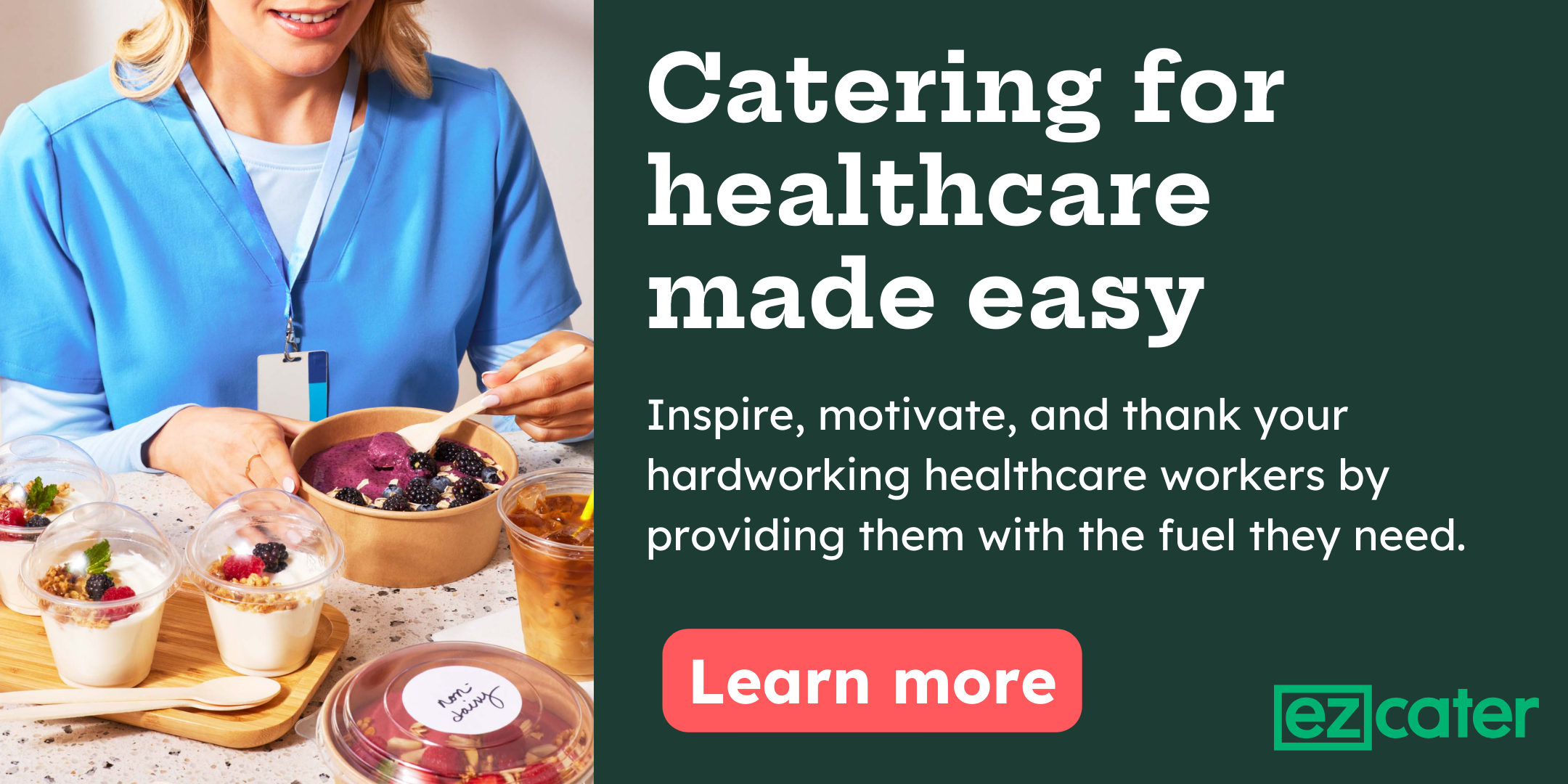
Healthcare workers clock longer than average work days
While the public has developed a much-deserved appreciation for hard-working healthcare professionals in recent years, it might be eye-opening to learn just how challenging their work week is.
ezCater’s survey found that healthcare professionals’ work days and weeks are longer than most.
- 55% work 40 or more hours per week
- 66% say they work even longer in their “busy seasons” (i.e. flu season, the winter)
- 55% of nurses work average shifts of 10 hours or more
Despite promoting healthy lifestyles to their patients, many healthcare workers are not practicing what they preach, and are feeling drained as a result.
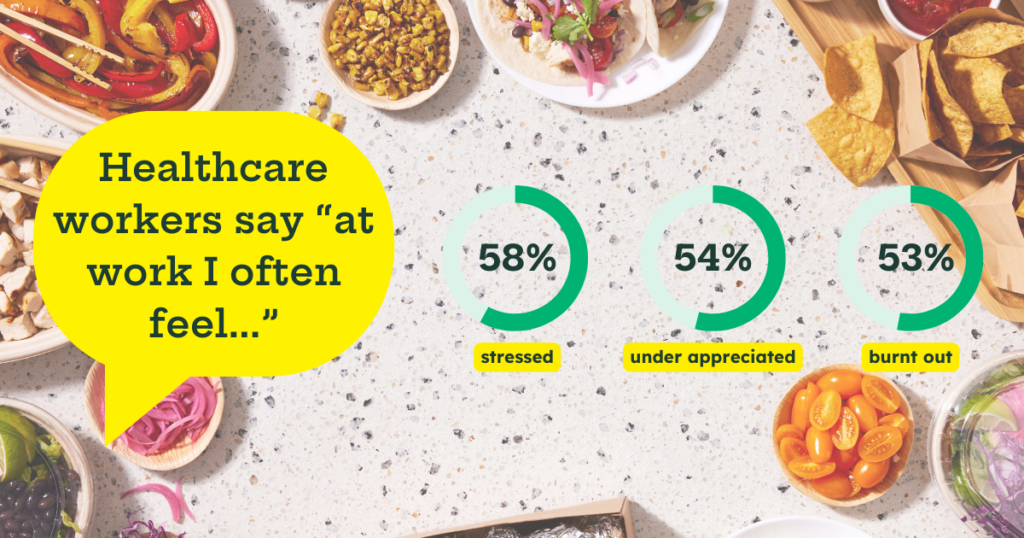
The impact on the workday
With their busy (and stressful) work schedules, proper meal breaks are not a top priority for many healthcare workers.
In fact, a quarter of healthcare professionals say they almost never take a meal break away from their workstation. For those who do break for a meal, 71% say it’s for 30 minutes or less.
When respondents do manage to grab a bite to eat, many end up choosing fast and convenient options over nutritional ones.
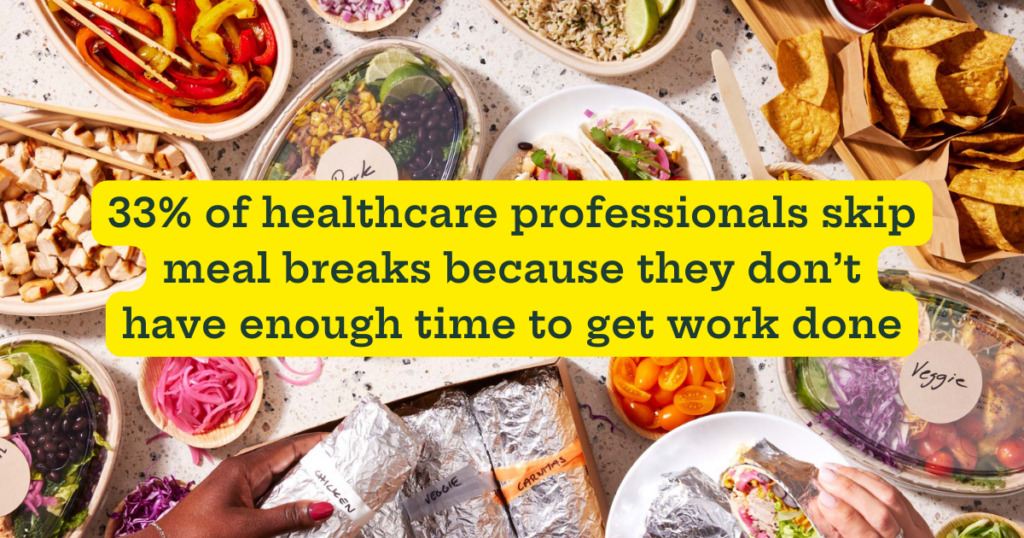
Many healthcare workers run on caffeine and junk food
Whether it’s multiple cups of coffee, energy drinks, or vending machine snacks, healthcare workers often rely on a quick fix rather than a balanced meal. In fact, more than 3 in 4 say they drink a caffeinated beverage (coffee, energy drink, soda, etc.) instead of eating a meal at least once per week.

Healthcare workers’ less-than-healthy eating habits:
- 27% say they frequently eat ‘makeshift meals’ during the workday because they forgot to pack a lunch or don’t have time to run out and buy something
- 59% say they skip a meal or forget to eat a meal during the work day at least once per week; that number jumps to 70% during busy seasons
- 1 out of 5 nurses buy food from a vending machine during their shift
- Only 22% of healthcare professionals feel that the meals they eat at work are healthy or very healthy
- Fast food is the most common food purchase (50% get it at least once per week)
Generational differences
ezCater’s survey also took a look at different groups of healthcare workers to identify trends, including which ones are struggling most with long hours, stress, and not finding time for meals. That distinction goes to Gen Z as they revealed they are feeling the impact more than their older colleagues.
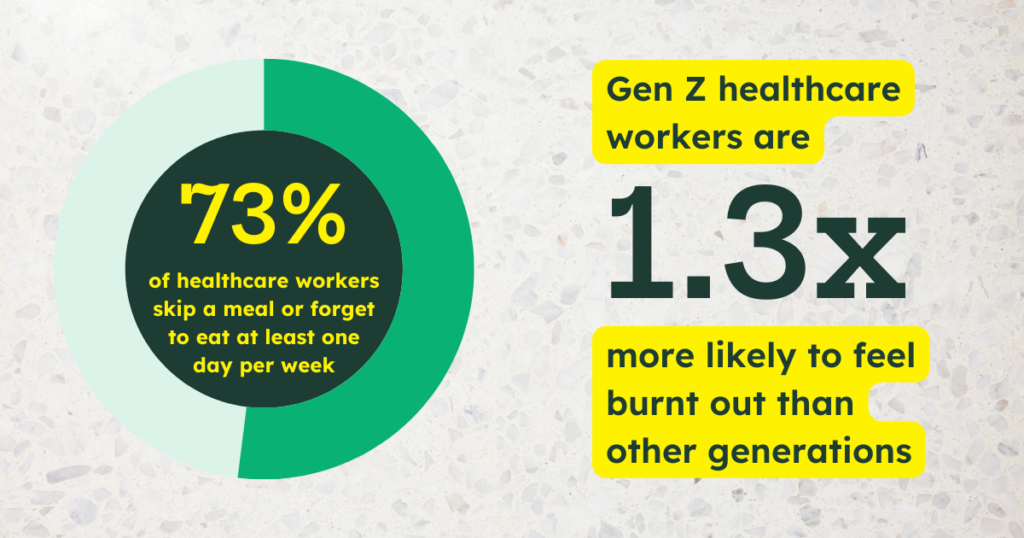
Shifts, job role, and workplace setting play a role in workday eating habits
Healthcare encompasses all different types of work including “regular” work days in a medical office and shift work in a hospital. Not surprisingly, those who have longer, patient-facing shifts – like hospital nurses – tend to feel the most stressed and time-crunched. If anyone could benefit from having ample time to recharge and refuel, it’s healthcare heroes who are on the frontlines of patient care.
Unfortunately, 8 out of 10 healthcare workers who work more than 10 hours at a time say that they are so busy taking care of everyone else that they forget to take care of themselves – including taking food breaks.
Those working 10+ hours are much more likely to skip a meal or forget to eat during the work day at least one day per week – 67% vs. the 55% who work less than 10 hours.
Shifts aside, the type of healthcare job one has can also make taking breaks more challenging. For example, nurses are the most likely to skip a proper meal break due to not having enough time in the day to get work done (48% vs. non-nurses 29%).
Setting matters, too. For example, hospital workers are more likely to say the meals they eat at work are ‘not very healthy’ or ‘not healthy at all’ (34% vs. 25% at other worksites).

How to Help Healthcare Workers Stay Fueled
Good nutrition and mental rest breaks are so important for getting through the work day, especially for workers who are responsible for the health and well-being of others. Without taking care of oneself, it can become challenging to stay focused on the intricacies of patient care in a fast-paced environment or over the course of a long shift. In some instances, not eating may even contribute to feeling unfocused or exhausted, which isn’t ideal for any of the parties involved: the workers, the patients, or the healthcare organization..
Employers can help their hard-working healthcare staff by encouraging them to take proper breaks, as well as providing access to nourishing and healthy snacks and meals onsite.
One popular idea is to offer free or subsidized meals and snacks in order to encourage fueling during the work and to build morale. In the survey, 90% of healthcare workers said free meals at work make (or would make) them feel appreciated. In fact, among healthcare professionals whose companies do offer food (34% of all survey respondents), they consider it their most appreciated perk/benefit (87%).
What healthcare workers have to say about free food at work:
- 48% say food at work saves them time on meal prep
- 42% say employer-provided food gives them a “real break” during the work day
- 72% say they can focus better after an employer-sponsored meal break
How Employers can Help Healthcare Workers Prioritize Meal Breaks
Healthcare workers are notoriously some of the hardest working people, but sometimes their diligence and work ethic drive them to power though without eating or taking a moment to decompress. One way that employers can help ensure their workforces stay fueled is by providing onsite food, whether it’s on occasion or done on a consistent schedule. Some ideas you can incorporate:
Celebrate healthcare professionals with catered meals throughout the year:. Providing food during special events and holidays like National Nurses Week, which begins each year on May 6th and ends on May 12th (Florence Nightingale’s birthday), can make workers feel valued. Along those lines, you might offer a catered team lunch to celebrate a worker’s anniversary, promotion, or other milestone.
Offer regular appreciation days. Catered meals don’t have to be a daily event to make a difference, but you also don’t have to wait for special circumstances or once-a-year events. Think about starting a new employee appreciation perk like “Free Lunch Fridays,” or maybe have a catered meal at your bi-weekly staff meetings, like MedCura Health does. The frequency is less important than the gesture itself.
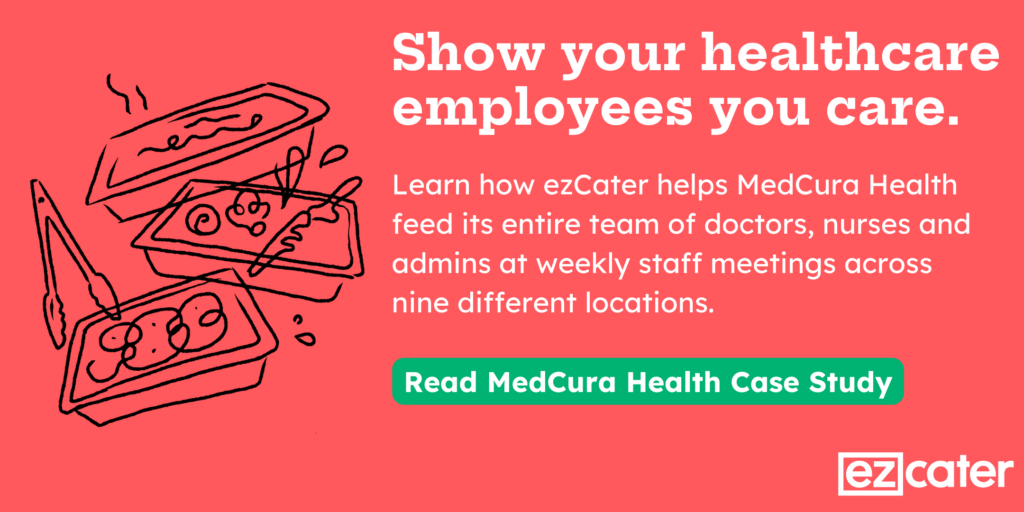
Let workers know “your meal break is on us.” Sometimes it’s nice to take a break from the cafeteria. A fun food perk may be to let employees pick out their own individually packaged meals once or twice per week from local restaurants using Relish by ezCater. You set the budget, they make their food selection, and everyone’s order arrives at the same time, delivered straight to your workplace.
Encouraging meal breaks – whether subsidized or not – can remind your healthcare workers that it’s not only OK to take breaks, but that it’s essential for their well-being. It also sends a clear message: that the people who take good care of others deserve some care, too.
Feed your hardworking healthcare workers with ezCater
Healthcare workers have some of the most important yet challenging responsibilities – which makes it all the more vital to provide them with the fuel needed for them to recharge. Whether you’re looking to feed nurses, doctors, admins, or other healthcare professionals, you can rely on ezCater. Learn how we can simplify catering for your healthcare team.








